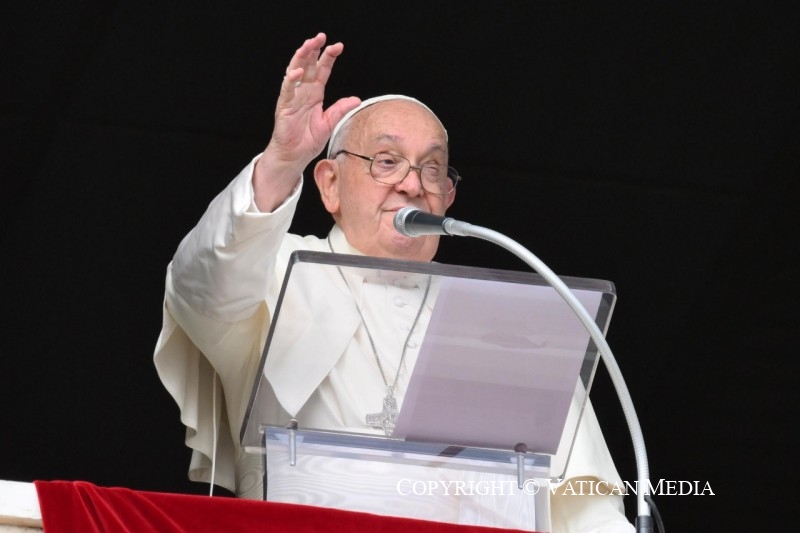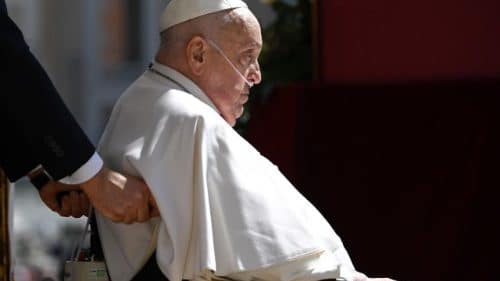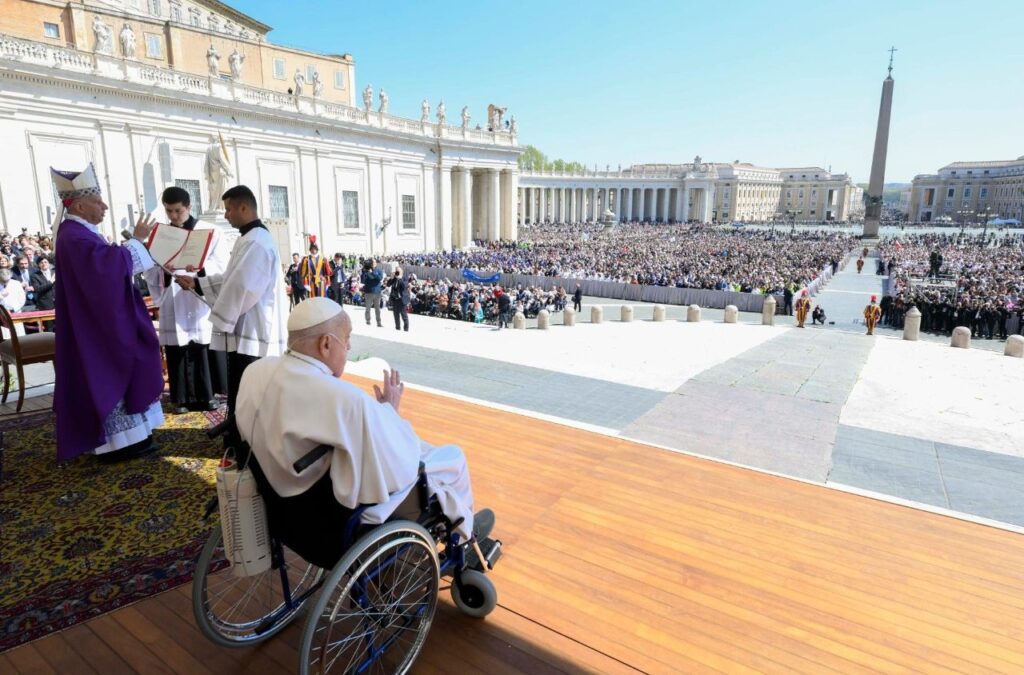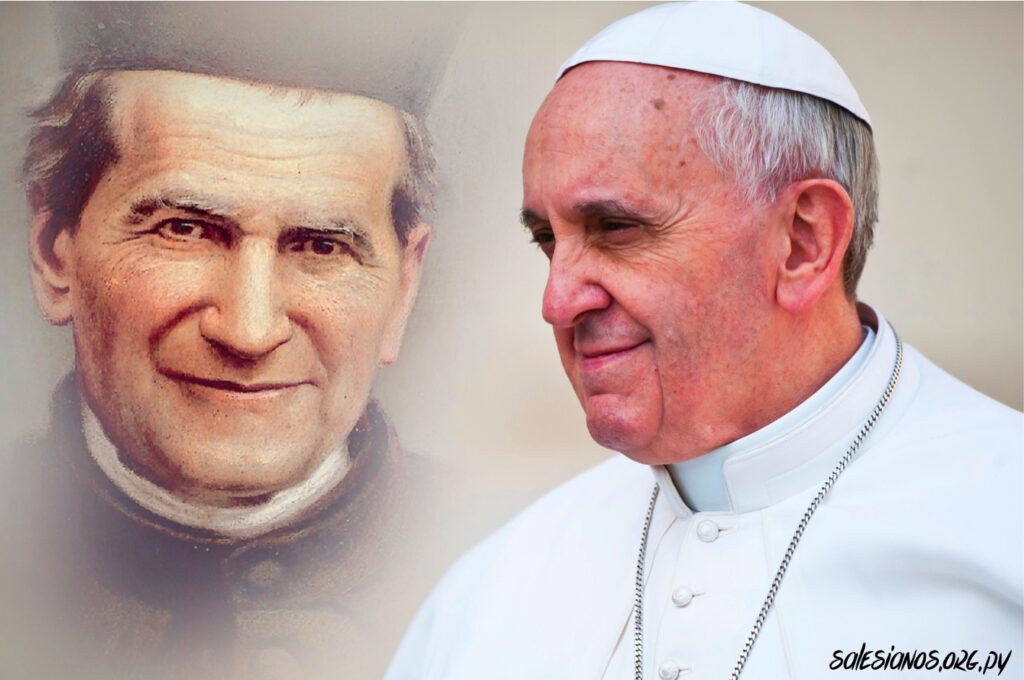Jesus sees the beggar, and listens to him, with the ears of his body, and with those of his heart
Words of the Holy Father at the Angelus

At noon today, at the end of the Holy Mass presided over by the Holy Father, in the Vatican Basilica, at the conclusion of the Second Session of the XVI Ordinary General Assembly of the Synod of Bishops (2-27 October 2024) on the theme: “For a synodal Church: communion, participation and mission”, the Holy Father Francis appeared at the window of the study of the Vatican Apostolic Palace to pray the Angelus with the approximately 30,000 faithful and pilgrims gathered in St. Peter’s Square for the usual Sunday appointment.
These were the words of the Pope at the introduction of the Marian prayer:
***
Words of the Pope
Dear brothers and sisters, good Sunday!
Today the Gospel of the liturgy (Mk 10:46-52) tells us about Jesus who cures a man from blindness. His name is Bartimaeus, but the crowd in the street ignore him: he is a poor beggar. Those people do not have eyes for the blind man; they leave him, they ignore him. No caring gaze, no feeling of compassion. Bartimaeus does not see either, but he hears and he makes himself heard. He shouts, he cries loudly, “Son of David, have mercy on me!” (v. 48). Jesus, however, hears and sees him. He places himself at his disposal and asks, “What do you want me to do for you?” (v. 51).
“What do you want me to do for you?”. This question, before a blind person, seems to be a provocation, and instead, it is a test. Jesus is asking Bartimaeus who he is truly looking for, and for what reason. Who is for you the “Son of David”? And thus the Lord starts to open the blind man’s eyes. Let us consider three aspects of this encounter, which becomes a dialogue: the cry, faith, the journey.
First of all, the cry of Bartimaeus, which is not only a request for help. It is an affirmation of himself. The blind man is saying, “I exist, look at me. I do not see you, Jesus. Do you see me?”. Yes, Jesus sees the beggar, and he listens to him, with the ears of the body and those of the heart. Think of ourselves, when we cross paths with a beggar on the street: how many times do we look away, how many times do we ignore him, as though he did not exist? And do we hear the cry of beggars?
Second point: faith. What does Jesus say? “Go your way; your faith has made you well” (v. 52). Bartimaeus sees because he believes; Christ is the light of his eyes. The Lord observes how Bartimaeus looks at him. How do I look at a beggar? Do I ignore him? Do I look at him like Jesus does? Am I capable of understanding his demands, his cry for help? When you give alms, do you look the beggar in the eye? Do you touch his hand to feel his flesh?
Finally, the journey. Bartimaeus, healed, “followed him on the way” (v. 52). But each one of us is Bartimaeus, blind within, who follows Jesus once he has approached Him. When you approach a poor person and make your proximity felt, it is Jesus who approaches you in the person of that poor man. Please, let us not be confused: alms are not the same as handouts. The person who receives the most grace from almsgiving is the one who gives, because he makes himself seen by the eyes of the Lord.
Let us pray together to Mary, the dawn of salvation, that she may guard our path in the light of Christ.
_______________________________________________________
After the Angelus
Dear brothers and sisters!
Today we have concluded the Synod of Bishops. Let us pray that everything we have done in this month may go forward for the good of the Church.
This 22 October marks the fiftieth anniversary of the creation, by Saint Paul VI, of the Commission for Religious Relations with the Jews, and tomorrow will be the sixtieth of the Declaration Nostra aetate of the Second Vatican Ecumenical Council. Especially in these times of great sufferings and tensions, I encourage those who are engaged at local level in dialogue and for peace.
Tomorrow an important International Conference of the Red Cross and Red Crescent will open in Geneva, seventy-five years after the Geneva Conventions. May this event awaken consciences so that, during armed conflicts, the life and dignity of people and peoples, as well as the integrity of civil structures and places of worship, are respected, in accordance with international humanitarian law. It is sad to see how hospitals and schools are destroyed in war in some places.
I join with the beloved Church of San Cristóbal de las Casas, in the Mexican state of Chiapas, which is mourning the priest Marcelo Pérez Pérez, murdered last Sunday. A zealous servant of the Gospel and of the faithful People of God, may his sacrifice, like that of other priests killed for their fidelity to the ministry, be a seed of peace and Christian life.
I am close to the population of the Philippines, struck by a powerful cyclone. May the Lord support that people, so full of faith.
I greet you all, Romans and pilgrims. In particular, I greet the Confraternity of the Señor de los Milagros, of the Peruvians in Rome, whom I thank for their witness and encourage to continue on the path of faith.
I greet the group of seniors from Loiri Porto San Paolo, the candidates for confirmation from Assemini, Cagliari, the “Pilgrims of health” from Piacenza, the Cistercian Secular Oblates of the Shrine of Cotrino, and the Confederation of the Poor Knights of Saint Bernard of Chiaravalle.
And please, let us continue to pray for peace, especially in Ukraine, Palestine, Israel, and Lebanon, so that the escalation may be stopped and respect for human life, which is sacred, be put in first place! The first victims are among the civilian population: we see this every day. Too many innocent victims! Every day we see images of slaughtered children. Too many children! Let us pray for peace.
I wish you all a good Sunday. And please, do not forget to pray for me. Enjoy your lunch, and arrivederci!
Related

Pope Francis silently prays before St. Pius X in the heart of the Vatican
Exaudi Staff
10 April, 2025
1 min

Pope Francis’ Catechesis: The Rich Man. Jesus “Looked at Him with Love”
Exaudi Staff
09 April, 2025
4 min

Francis is recovering: progressing progressively
Exaudi Staff
08 April, 2025
2 min

The Pope to the Salesians: “Serve others without holding anything back”
Irene Vargas
07 April, 2025
2 min
 (EN)
(EN)
 (ES)
(ES)
 (IT)
(IT)

